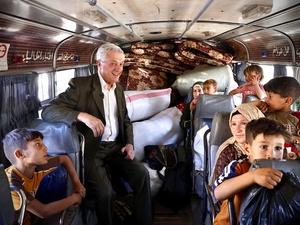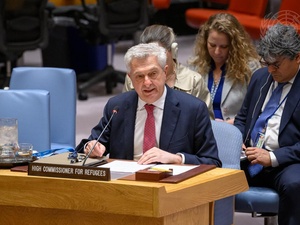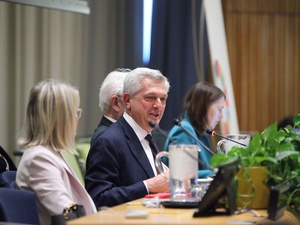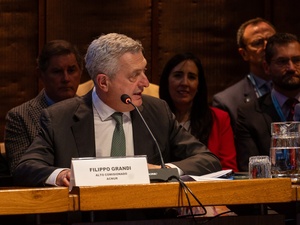High Commissioner's speech at the Georgetown Walsh School of Foreign Service, Commencement Graduate Class 2025
High Commissioner's speech at the Georgetown Walsh School of Foreign Service, Commencement Graduate Class 2025

UN High Commissioner for Refugees Filippo Grandi speaks at the Georgetown University School of Foreign Service Commencement Graduate Class 2025.
Thank you, President Groves, for your introduction. And thank you, Nabin, for reading the beautiful citation.
Thank you, Georgetown University – Dean Hellman, Provost Colbert – for the honorary degree: as somebody who benefited, in his youth, of Jesuit education, this special, humbling distinction touches me deeply. It is an honour to be here, also on behalf of the millions of refugees whom my colleagues at UNHCR work with, every day, around the globe.
And thank you all for allowing me to be part of your commencement celebration: let me start by extending my warmest congratulations to the Georgetown School of Foreign Service, Graduate Class of 2025.
Obviously, you and I are at opposite ends of our respective career paths – me looking back at many years of service; you, surely, looking forward to an exciting future. And of course, many things are different in our experience: in how we interact with technology, for example, to make sense of the world and to understand our place within it. The cultural filters through which we grapple with historical events or interpret political dynamics will not be the same – as is normal, in this fast-evolving world. We are inevitably different – you might even say foreign – in subtle and in less subtle ways.
But today, I would like to share with you a few reflections about the things that we share: values that transcend time and experience. About the commitment to service, which is in the name of your school and that – I have no doubt – has its place within each one of you, and that this institution, along with all those who supported you along the way – parents, friends, teachers, the communities to which you belong – have cultivated in you as you begin your professional lives.
I know that the late Pope Francis – the first Jesuit pope – holds a special place in the heart of this great institution. He does also in the heart of my organization, and in my own. Pope Francis was, as Nabin just reminded us, a champion for refugees. A beacon of moral clarity who spoke powerfully about the suffering of the millions of people who today are forced to flee their homes, and too often their countries, because of conflict and persecution. Forced to abandon their communities, their studies, if not their dreams, in search of safety.
We live in a world where borders continue to matter – politically, economically, culturally. But when you choose a life of foreign service, you are, by definition, choosing to look beyond the borders of your country. And this is not just about you projecting yourself towards an international career. You should also know that you are choosing – whether consciously or not – to let the foreign in, to make sisters and brothers of strangers – to use my own experience, of refugees. To welcome them as one of your own. Fratelli Tutti – a common fraternity – as Pope Francis so beautifully put it.
And as you take on this enormous responsibility – a privilege even, I would argue – you should be prepared to be changed and challenged, sometimes in uncomfortable ways. Those among you who have siblings will know what I mean.
Because the world is uncomfortable. War and displacement come with smells, with noise, with pain. Human suffering is messy. You can feel and touch it. It is a visceral experience – disorienting, nerve-racking, shocking. Suffering is anything but abstract because it involves people. And people are complicated. One minute, you are confronted with horrifying stories of sexual violence – that is, shamefully, the daily reality of many women, girls and boys in conflict situations, and the next you witness the incredible generosity of communities as poor as the refugees themselves – communities that receive refugees out of unquestioned compassion. And you can find that same dynamic in every crisis. We cannot escape the paradoxical conclusion that while there is no limit to what people will do to each other, there is also no limit to what they will do for each other. That even in the darkest of times, there is hope.
Please never lose sight of that hope.
Because – and I should know: I spent more than 40 years as a humanitarian, starting my very special kind of “foreign service” as a young Catholic Relief Services volunteer at the Thai-Cambodian border in the 80s – because there will be times when you will be tempted to give up. Tempted to turn inwards as the problems feel too big. There will be times – and we are going through some even right now – when it will be easier to think in terms of what will benefit you. What will make your people, your community, your country stronger and happier. But that is an illusion. I still believe in the power of working together across those borders. I believe in that rather strange but important concept that we call multilateralism. I believe that some problems facing the world today – forced displacement is one of them, but there are many – cannot be solved by any country alone, irrespective of how powerful that country may be.
And so, you will need courage and conviction to stay the course. For that is leadership. Leadership, in these complicated times, as I often say, and as the extraordinary evangelical admonition tells us, is to be wise as serpents, and innocent as doves. Leadership is remaining true to your values, and to your commitment to service, even in the face of adversity.
True leaders understand that you only really move ahead when you bring others with you. When you move together. So, I encourage you, as the leaders of tomorrow, not only to look forward, or to look up, but also to look behind you, to remember those who have been forgotten, or pushed aside.
The new Pope Leo XIV, a few days ago, quoted St Augustine, and I want to share this quote with you, as it is beautiful: ‘We make our times; because such as we are, such are the times’.
The future is your time. You have the power to define it. And as you do, remember to live well, and to do good.






